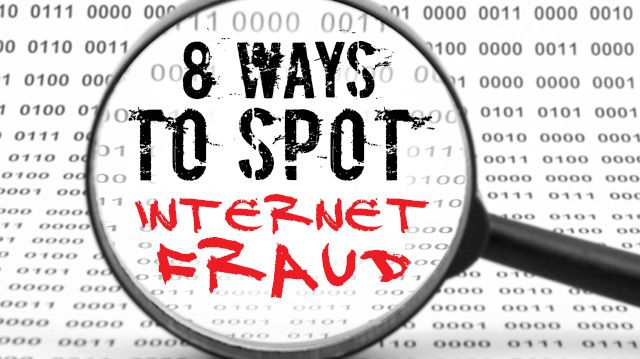Most savvy Internet users can identify a scam a mile off: Poorly spelled emails demanding a recipient’s Social Security number are clearly not on the up-and-up. But not all scams are so easy to spot. Some are designed to pull at heartstrings. Others play on our natural concern for friends’ welfare. Still others exploit the near-universal appeal of easy money. Who hasn’t wondered what they’d do with that winning lottery ticket?
When it comes to Internet fraud, knowledge is key. Here are 8 ways to spot an online scam.
The source is illegitimate
If there were a magic search engine that could automatically reveal illegitimate sources, online scams would be a thing of the past. There is no such solution, but there are a number of tell-tale signs that should serve as red flags. First, emails from legitimate companies have professional domain names. If an unsolicited email is coming from gmail or yahoo, be cautious. Second, check the URL of suspicious websites. If they are misspelled or seem “off” in some other way, they are likely illegitimate. Nevertheless, scammers are getting better at setting up realistic looking sites with few or no obvious mistakes. Be skeptical.
It’s too easy
Sometimes a very lucky person wins the lottery. Chances are unbelievably good that you are not that very lucky person. You are also unlikely to have a long-lost wealthy relative who dies leaving you a small fortune. If it’s too good to be true, chances are it is not true. Don’t give it a second thought and not even one click. Assume it’s a scam and move on.
It requires your personal information
The more cautious world wide web users never send personal information via email. In fact, they don’t enter personal information anywhere online that hasn’t been verified and secured. Your bank’s official website? Sure. The pop-up window that promises you a beautiful foreign wife? Not so much. No one – not even your bank – should be asking for personal information over email. Keep your bank card in your wallet, your Social Security number secure and your home address to yourself. Any reputable company and/or person that needs this information will be collecting it in a more secure way.
It requires up-front cash
The main purpose of Internet scans is to make money. Any product, deal or investment opportunity that requires up-front cash has the potential to be a scam. If the deal spontaneously appeared in your email inbox, delete it immediately. If you found it online, do some research. Google the company name. Read independent reviews of the product – not those on the website itself. Also, be wary of wire transfers. These are much more difficult to trace than credit card transactions.
It plays on your emotions
Often, Internet scams play on the emotions of their victims. Your friend Reggie probably isn’t wandering the streets of India penniless, having just been robbed. Puppies are not being tortured in Cameroon. If you just can’t help but feel terrible about the state of unloved puppies overseas, find a reputable animal welfare non-profit and donate. Sending money to the paypal account of savethepuppies45@gmail.com is not going to help even one puppy.
It plays on your fears
A number of scams operate by tapping into their victims’ fears. Pop-ups claiming that a user’s computer is infected with some sort of malware or virus are particularly popular. In general, avoid downloading content online. Specifically, never download content that originated from a pop-up advertisement or from a poorly designed site that is riddled with pop-ups. If you click on something that looks harmless and a download begins, cancel it as quickly as possible. Increasingly, links in email download what’s known as ransomware, locking up your computer until you send money. Keep a safe backup of all files off your main computer.
It is marked “URGENT!”
Scams are most effective when would-be victims are not thinking clearly or carefully, One popular scam sends an email to employees demanding a quick money transfer. Scammers claim to be the company’s CEO. The success of these scams has been linked to their timing. They are sent at the end of the workday when employees are anxious to go home. Instead of double checking the sender’s email address or questioning the transaction, victims just get it done. People in a rush make split-second decisions. The portrayed urgency of online scams is designed to take advantage of this fact. Often, a few hours’ distance will bring clarity and the realization that the urgent offer is just another scam.
Relationship Fraud
Relationship fraud gets its own special footnote. It is often emotionally and financially devastating. It is also the most common example of online fraud reported to the Internet Crime Complaint Center. Most online scams target many people. Criminals make money by relying on only a small percentage of people to take the bait. Relationship fraud is different. Scammers often have only a handful of victims and spend hours drafting emails, sending texts and chatting online. Months later a series of unfortunate events require the victim to “lend” money to their new-found love. People have been taken in for hundreds of thousands of dollars.
—Erin Wildermuth
Erin is a freelance writer, photographer and filmmaker. She is passionate about moving beyond party politics to identify pragmatic solutions to social, economic and political problems. Her writing has appeared in the Washington Times, the American Spectator, Doublethink and Scuba Diver Magazine. She spends her free time scuba diving, snowboarding and ravenously reading popular nonfiction. Erin holds a master’s degree in International Political Economy from the London School of Economics.
Sources:
http://blog.credit.com/2012/09/4-ways-to-spot-an-internet-scam-62358
http://netsecurity.about.com/od/informationresources/a/How-To-Spot-An-Online-Scam.htm
http://money.usnews.com/money/personal-finance/slideshows/10-ways-to-avoid-online-scams
https://emotionalfinance.net/2016/02/25/scams-victims-and-and-scammers
http://www.tripwire.com/state-of-security/security-awareness/internet-scams-its-no-longer-merely-emotional-part-2

